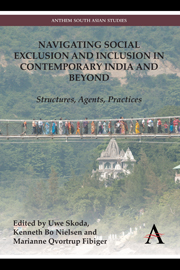 Navigating Social Exclusion and Inclusion in Contemporary India and Beyond
Navigating Social Exclusion and Inclusion in Contemporary India and Beyond Book contents
- Frontmatter
- Contents
- Acknowledgements
- List of Contributors
- 1 Introduction: Navigating Exclusion, Engineering Inclusion
- Part I Spaces and Values
- Part II Communities and Politics
- 5 In Search of Development: Muslims and Electoral Politics in an Indian State
- 6 Exclusion as Common Denominator: Investigating ‘Dalit-hood’
- 7 Inclusion of the Excluded Groups through Panchayati Raj: Electoral Democracy in Uttar Pradesh
- 8 Making Sikkim More Inclusive: An Insider's View of the Role of Committees and Commissions
- 9 Encountering ‘Inclusion’ and Exclusion in Postindustrial Mumbai: A Study of Muslim Ex-millworkers' Occupational Choices
- Part III Resources and Development
5 - In Search of Development: Muslims and Electoral Politics in an Indian State
from Part II - Communities and Politics
Published online by Cambridge University Press: 05 September 2013
- Frontmatter
- Contents
- Acknowledgements
- List of Contributors
- 1 Introduction: Navigating Exclusion, Engineering Inclusion
- Part I Spaces and Values
- Part II Communities and Politics
- 5 In Search of Development: Muslims and Electoral Politics in an Indian State
- 6 Exclusion as Common Denominator: Investigating ‘Dalit-hood’
- 7 Inclusion of the Excluded Groups through Panchayati Raj: Electoral Democracy in Uttar Pradesh
- 8 Making Sikkim More Inclusive: An Insider's View of the Role of Committees and Commissions
- 9 Encountering ‘Inclusion’ and Exclusion in Postindustrial Mumbai: A Study of Muslim Ex-millworkers' Occupational Choices
- Part III Resources and Development
Summary
The Muslim minority in the Indian state of West Bengal, where they comprise approximately 25 per cent of the population, are in many respects excluded from both the developmental and political processes in the state. Muslims score significantly lower on a range of socioeconomic indicators compared to other sections of the state's population, and their representation in the political sphere is poor. However, the past five years have witnessed an increasing mobilization of Muslim groups and organizations seeking to address and overcome this ‘development deficit’. As part of this mobilization search of development, these organizations have used the Muslim electorate's – whose vote determines the outcome in somewhere between 50 and 80 of the state's 294 constituencies (Choudhury 2010) – strength of numbers to promote issues of concern to Muslim voters. In doing so, they have succeeded in putting significant pressure on all major political parties in the state, who in recent years have found themselves engaged in an intense political competition that culminated with the ouster of the incumbent Left Front (LF) government at the 2011 state assembly elections. This situation of intense political competition is new to West Bengal. Here, the LF government, which ruled West Bengal from 1977 to 2011, has approached virtually all recent state elections as the odds-on favourite to win. But by 2011 the two major political formations in the state – the LF and an alliance of parties led by the Trinamul Congress (TMC) – were more evenly matched.
- Type
- Chapter
- Information
- Navigating Social Exclusion and Inclusion in Contemporary India and BeyondStructures, Agents, Practices, pp. 73 - 96Publisher: Anthem PressPrint publication year: 2013


